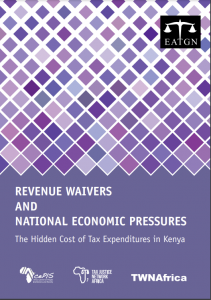REVENUE WAIVERS AND NATIONAL ECONOMIC PRESSURES: The Hidden Cost of Tax Expenditures in Kenya
When utilized and applied effectively, tax incentives – which are exemptions or deductions from taxes owed to the government by corporations and individuals – can be useful in attracting and encouraging investors in the country. However, the extension of tax incentives in Kenya and the limited transparency around its application has become an issue of concern in Kenya. This comes in the wake or risking fiscal pressure and shrinking fiscal space occasioned by increased public debt burden and widening budget deficits. There have been increased questions regarding the modalities and architecture of tax incentives in Kenya, with concerns that these incentives result in erosion of the tax base while generating little in return to the economy.
It is against this background that the Third World Network (TWN), Tax Justice Network Africa (TJNA), the East African Tax Governance Network (EATGN), and Africa Centre for People Institutions and Society (ACEPIS), commissioned a study on Kenya’s Tax Expenditures Framework. This study examines the extent to which tax incentives have impacted Kenya’s tax base. More precisely, the study assessed Kenya’s tax expenditures for the years 2017-2020 on the elements of transparency, accountability, efficiency, adequacy, and equity. Among the key findings highlighted is that the government of Kenya incurs huge revenue losses attributed to tax expenditures that do not seem to match the prevailing fiscal situation – characterised by slow growth, fiscal deficits and a debt repayment burden. Additionally, available evidence points to an opaque, unaccountable, less equitable, inefficient and inequitable framework of tax expenditures that requires review based on rigorous assessment using government data driven by multi-agency coordination.
Download File

